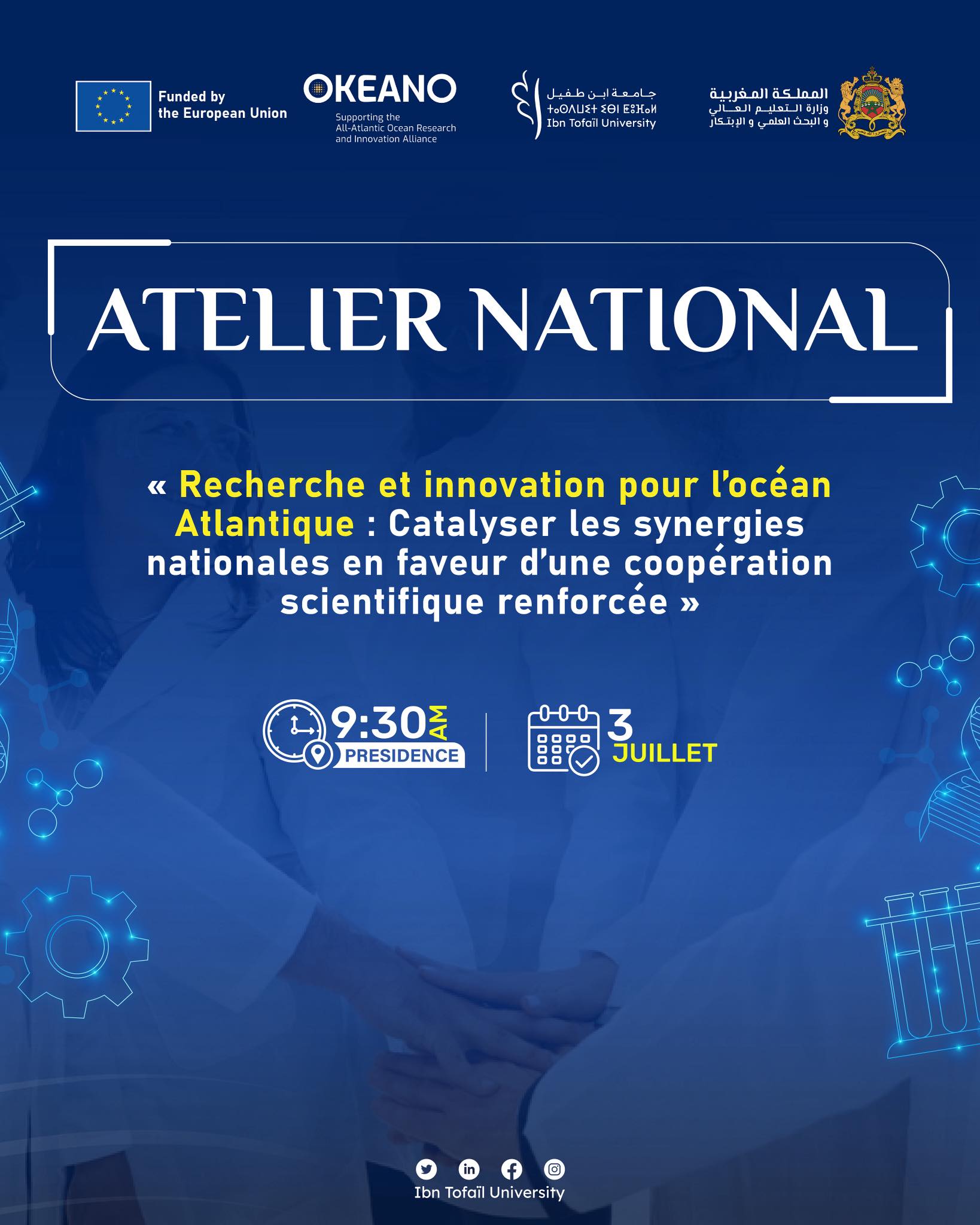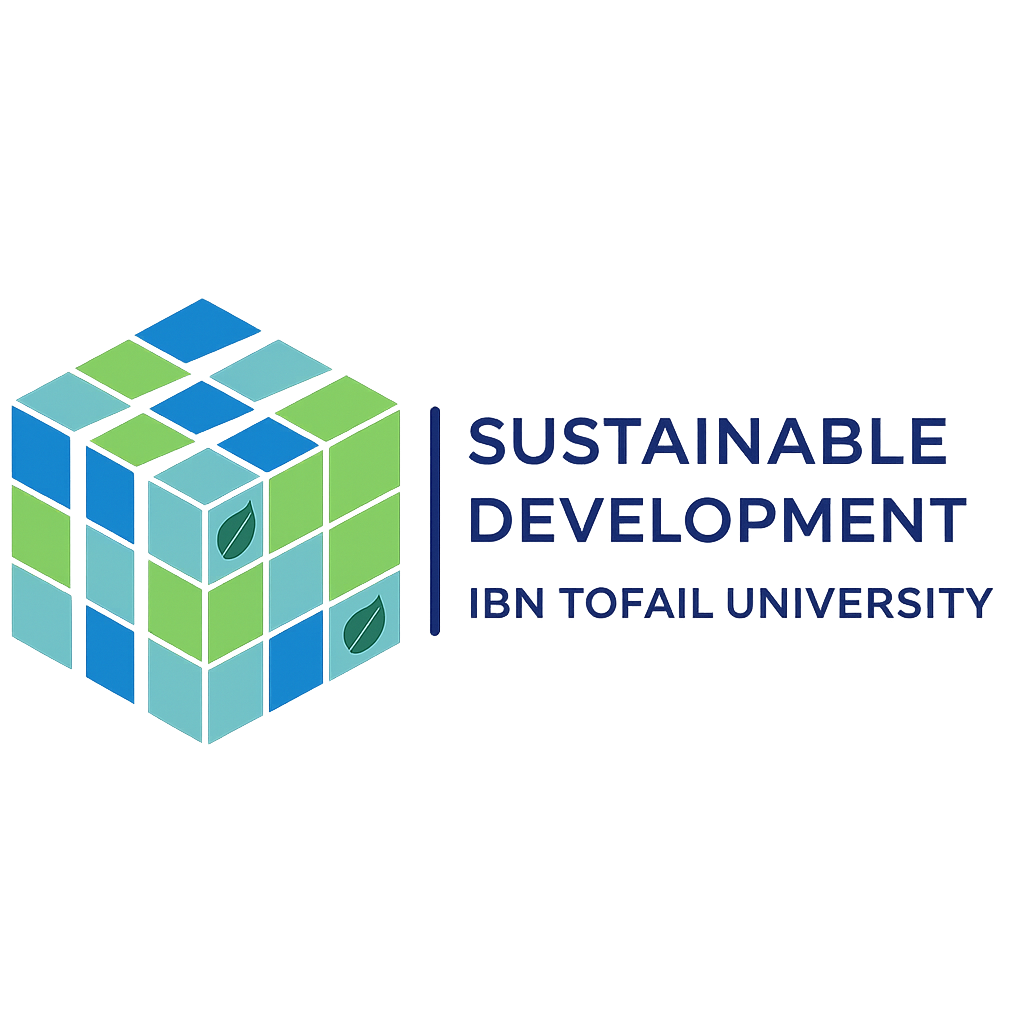Event : 3 July 2025
Partner : The Ministry of Higher Education, Scientific Research and Innovation of Morocco – Ibn Tofail Université – OKEANO – the European Union
“The ocean is not just water; it is the mirror of our existence.”
Imagine a Morocco without its Atlantic Ocean, without its rich fisheries, climate buffer, or coastal livelihoods. It’s almost impossible to picture such a loss, because this ocean is not only a geographical feature but a vital source of life, opportunity, and identity. It connects Morocco to the world and grounds its communities in a culture shaped by waves, currents, and the unseen wealth beneath its surface.

It is in this spirit that Ibn Tofaïl University hosted a national workshop on July 3, 2025, under the theme: “Research and Innovation for the Atlantic Ocean: Catalyzing National Synergies for Enhanced Scientific Cooperation.” This timely gathering, organized in partnership with the European Union, within the Horizon Europe programme and the OKEANO project, became a stage for scientists, researchers, activists, and institutions to come together, not only to reflect but to act.
Throughout the day, the university’s conference hall transformed into a vibrant center of thought and purpose. The opening session brought forward the voices of institutional leaders, including representatives from the Ministry of Higher Education and Ibn Tofaïl University’s presidency. These opening remarks set the tone: saving the ocean is not a technical topic; it’s a national mission that demands commitment at all levels.
What followed was a sequence of insightful presentations and open discussions. Experts such as Dr. Laura Mcdonagh from the Marine Institute in Ireland presented the broader framework of AAORIA, the All-Atlantic Ocean Research and Innovation Alliance. Then, Prof. Zebakh Sanaa, coordinator of the event, gave an overview of the OKEANO project and Morocco’s active participation within it. The conversation turned to national perspectives with Dr. Zina El Malki from INRH (National Institute for Fisheries Research), who highlighted national marine priorities and research programs. Each speaker helped weave together a broader picture of Morocco’s efforts in oceanic research and its strategic role in Atlantic cooperation.
A particularly engaging moment came with presentations on real case studies and institutional experiences. Prof. Benmohammadi from FS-UIT explored the role of ocean research at Ibn Tofaïl University, while representatives from the IOI Ocean Academy and ECOP Morocco stressed the importance of youth engagement and the need to build a strong ocean culture across sectors. The final scientific talk by Prof. Leila Alem from the University of Technology of Sydney tackled the challenge of transdisciplinary research and how intellectual property and technology adoption can either accelerate or limit ocean preservation efforts.
This was not a one-way exchange. The workshop was rich with interactive discussions, allowing participants to ask questions, express concerns, and suggest new directions. The tone was ambitious but realistic. Participants were not only interested in celebrating achievements but in identifying gaps and correcting paths. As one participant put it, “We are not here to list what we’ve done, we are here to figure out what’s still missing.”
A key theme that emerged throughout the day was the need to involve ordinary citizens, especially those directly affected by marine policies, such as coastal communities, youth, and small-scale fishermen. Several experts raised the importance of creating innovative ways to integrate non-specialists into the scientific and conservation process. Because without public understanding and inclusion, even the most advanced research risks falling short. This inclusive approach was framed not just as a civic gesture but as a cornerstone of academic progress and long-term resilience.
By the time the closing session arrived, the energy in the room had evolved from analysis to responsibility. The final messages emphasized the urgency of collective action, the importance of building lasting institutional bridges, and the necessity of moving from words to results. This event was more than a dialogue; it was a joint commitment, a reminder that the Atlantic’s fate depends on what we choose to do now, together.
The OKEANO project (2024–2027), backed by 15 institutions from Europe, Africa, and Latin America, is a living example of this commitment. Through transatlantic collaboration, it aims to strengthen marine science ecosystems, promote innovation, and offer practical tools for tackling the world’s most urgent ocean-related challenges. Morocco’s leadership within this initiative is strategic, and its academic institutions, especially Ibn Tofaïl University, are rising to the occasion.
As the workshop concluded, one powerful idea remained in everyone’s minds: water is life, and the Atlantic is Morocco’s heartbeat. To protect it is to protect our future. The task is enormous, but as the event showed, the will exists, the networks are forming, and the next chapter of Morocco’s ocean story is already being written, one partnership, one project, and one vision at a time.
